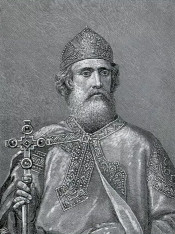
Prince Vladimir laid a course for the Orthodoxy and upbuilding of a new type of state in Russia
On July 28, 2017, our country celebrates the 1029th anniversary of Christianization of Russia and the 1002 anniversary of passing away of the Holy Great Equal of the Apostles Prince Vladimir, who has introduced the Christian Orthodoxy into Russia. There are dozens of manuscripts and research works from different years on the Presidential Library website. They observe an introduction of Christianity into Russia and a preceded it difficult choice by Vladimir Krasno Solnyshko (ruby-red sunshine) of acceptable for his state religion.
The date of the baptism of Kievsky Russia is considered the 988th year. It was this year when Prince Vladimir Krasno Solnyshko went through the ceremony of consecration with water and adopted a new Christian faith in Korsun. In the rare book of Ivan Nekrasov of 1888 Holy Great Equal of the Apostles Prince Vladimir: a story from Russian history tells how everything happened: “I am going to go through the rite of baptism. Before this I experienced your canon. I like your faith, some people who came to you from Kiev in behalf of me and my people told me about it.”
Even before Vladimir, according to legend, the doctrine of Christ was brought to the Russian land by the holy apostle Andrey Pervozvanny: “He sailed down the river further to the mountains — to the place where the city of Kiev is now… The apostle got up in the morning and told his followers: “Do you see these mountains? The grace of God will appear on these: there will be a great city here. By the will of God, many churches will be established here.” After these words, the Apostle ascended the mountains and blessed them. Then he erected a cross above them,” — according to the aforesaid edition of Holy Great Equal of the Apostles Prince Vladimir: a story from Russian history, based on the account of the chronicler from The Tale of Bygone Years.
However, the apostle's prophecy was still far from being realized. “Our ancestry did not recognize Christian faith, they believed in the mermaids, hobgoblins and the wood spirits, they worshiped idols… There was no one to teach them!” — a compiler of The few stories of the rural teacher: the beginning of Russia N. Freyman testifies in his 1894-year book, an electronic copy of which is available on the Presidential Library website.
The prince, who grew up in the period of paganism, eventually began to think about the role of religion in the formation of a strong state. “Vladimir was not a deep-rooted convinced pagan; he did not lead the creeds of his religion to self-sacrifice. It can be safely said that it did not satisfy the intelligent prince, and he had no firm belief in idolatry,” — N. Markov writes in the historical and biographical essay Great Saint Prince Vladimir of 1888, featured on the Presidential Library website.
“Vladimir called the boyars and the elders of the city and told them: “The Bulgarians came to me and said: accept our canon; then Jews came, after them the Greeks came, cursed all other canons, praised their own; they said that there is another light, and that whoever adopts their faith, after he dies, he will come to life again and then will never die; and whoever accepts the other canon will burn in the fire in the next world,” — K. Bestuzhev-Ryumin describes the process of choosing the faith in his work About the Baptism of Russia, St. Vladimir, his sons and Pechersky Monastery of 1910.
A strengthening of the state required the adoption of one single for all faith. This became possible only owing to the efforts and will of Saint Equal-to-the-Apostles Prince Vladimir. He has taken the trouble to study all four main religions, to comprehend and instill in Russia Christianity according to the Byzantine pattern in opposition to Rome. The political ambitions of the Roman church became a serious reason that influenced Vladimir's choice of Orthodoxy. Its domination over secular authorities for the Kiev princes was absolutely unacceptable.
In detail, Vladimir's choice of faith and the baptism of Russia are described in The Tale of Bygone Years, commented on by A. Shakhmatov in its 1916-year edition. V. Klyuchevsky narrowly and brightly told about this in his course of lectures on Ancient Russian history — an electronic copy of these published in 1885 lectures is currently available on the Presidential Library website.
The population initially met the baptism of Russia rather negatively than enthusiastically, like many other reforms. “Folks, blinded by pagan ignorance, looked at the book doctrine as at the sorcery, and Vladimir's favor seemed to him a misfortune,” — according to About the Baptism of Russia, St. Vladimir, his sons and Pechersky Monastery. The people preserved for many centuries their pagan beliefs and rituals were, nevertheless Vladimir’s asceticism brought undeniable results: Russia began to develop successfully as an Orthodox country.
The historical significance of the baptism of Russia for the strengthening and development of the state cannot be overestimated. After 988, Russia as a Christian state could claim a higher status in relations with other European countries, which strengthened international ties. One of the most important consequences of the baptism of Russia was the gradual consolidation of society on the basis of spiritual commonality; a general softening of moral customs, a desire for enlightenment were evident.
Orthodox Russia was developing, maintaining its identity and sovereignty.

